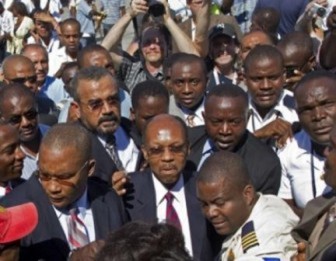PORT-AU-PRINCE, (Reuters) – Former President Jean-Bertrand Aristide made a triumphant homecoming to Haiti yesterday after seven years of exile, returning despite U.S. objections two days before a crucial presidential vote.

Thousands of enthusiastic followers turned out to greet the former leader, who is still widely revered in impoverished Haiti as a champion of the poor, although viewed by the United States as divisive figure who could disrupt tomorrow’s election.
Supporters whooped and cheered at Port-au-Prince airport as a smiling Aristide, accompanied by his family and U.S. actor and black rights activist Danny Glover, emerged from the charter plane that brought him home from South Africa.
“If you could lean against my heart you could hear how fast it is beating, how it is singing a melody to Haiti,” Aristide, wearing a blue suit, told reporters at the airport.
He said he had come back to make “a small contribution” to his country, which is struggling to recover from a devastating 2010 earthquake that killed more than 300,000 people and set back development in one of the world’s poorest states.
Screaming supporters of “Titide”, as he is affectionately known, waved Haitian flags and welcome banners and mobbed the black SUV that took him from the airport — with a police officer sitting on the front of the car.
At his spacious home in the capital’s Tabarre district, which had been refurbished for his arrival and draped with national flags, followers climbed walls and trees to pack the yard to greet him when he arrived.
One woman rolled on the ground in delight, screaming “Long Live Aristide.”
Aristide, 57, a charismatic former Roman Catholic priest, was ousted from power in 2004 through an armed rebellion.
He became Haiti’s first freely elected president in 1991, but was overthrown by the military after seven months.
His fiery brand of left-wing populism won him enemies among business elites and the army, which he eventually abolished.
Re-elected in 2000, his second term saw economic instability and violence, with critics accusing him of intolerance and persecution of opponents. Aristide, who had accused Washington of helping to engineer his 2004 exile, ignored a direct plea from the United States to delay his return to the Caribbean nation until after Sunday.
Washington and other western donors, who have pledged billions of dollars to help rebuild Haiti after the earthquake, had expressed fears that the homecoming of the former president could be destabilizing for the run-off election.
“PEACE IN THE HEAD
AND IN THE BELLY”
In the initial second-round run-off in the history of Haiti’s presidential elections, voters will choose between popular musician Michel “Sweet Mickey” Martelly and former first lady Mirlande Manigat. Donors hope the election will appoint a stable leadership to administer post-quake reconstruction funds.
In his first comments, Aristide mostly avoided overtly political issues but stressed the importance of including all Haitians in national life.
He did mention the “exclusion” of his Fanmi Lavalas party, Haiti’s biggest, which says it was barred from having its own candidate for the elections.
“We condemn all kinds of violence so that the education of young people can bring peace in the head and the belly,” Aristide said, recalling one of his old campaigning slogans. “This is a great day for the Haitian people,” said Ansyto Felix, an activist for the Fanmi Lavalas party,
U.N. peacekeepers, who are providing security for the polls, reinforced Haitian police in the streets. But the top U.N. official in the country, Edmond Mulet, told Reuters he was relieved Aristide had avoided talking about politics and that there had been no violence on his arrival.
“So far, so good,” Mulet said. “Right now we are focused on the elections on Sunday”.





